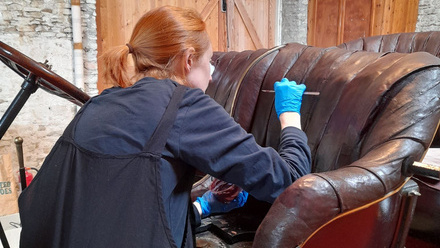There are several strands of activity that link my previous post at the Heritage Lottery Fund (HLF) with my role at Icon. Perhaps the most interesting and important is accreditation. As Head of Historic Environment at HLF I kept in touch with the various professional bodies (RIBA, CIfA, IHBC etc.) and was keen to champion the value and importance of accreditation, but I was often challenged to explain why HLF didn’t make employing accredited conservation professionals a key requirement of grant awards. The answer is essentially due to the problem of defining ‘conservation’ if you fund a broad range of projects across a spectrum ranging from objects to buildings to nature and places. How do you help novice grant applicants understand what is conservation, and what it is not?
In the past, the solution was offering grant programmes that specifically focussed on conservation and repair – such as the much-missed Grants for Places of Worship – but in the current Strategic Funding Framework this becomes unworkable because most grants are offered through ‘open’ programmes where almost anything heritage-related is in scope. So, the best that I could do was to write a policy statement setting out the value of accreditation.
Faced with a blank sheet of paper at the outset of writing this new policy I assumed that the websites of the various professional bodies would offer a wealth of convincing arguments about the benefits of accreditation. I was confident that I would be able to hoover up nuggets of wisdom on which to base my policy. However, to my dismay, my research uncovered very little useable material – though I have to say that the Icon website scored higher than most. I therefore concluded that accredited professionals know why accreditation is important, and are reasonably adept at explaining to their fellow professionals why accreditation supports personal professional development, but we haven’t fully mastered the knack of selling the idea to our potential clients and commissioners.
So, still faced with a relatively blank sheet of paper, I attempted to construct my own case for why accreditation matters. My key argument was that accreditation provides assurance that the professional has a personal skills matrix of independently verified competencies. These competencies include:
- An appreciation of the complex relationships between materials, culture, history and context.
- An understanding of the range of philosophical approaches that can be taken, from preservation through conservation to restoration, and the ability to offer guidance to the client on the most appropriate approach for each project.
- A ‘toolbox’ of skills, expertise and experience that can be deployed to ensure the proper care and conservation of cultural heritage.
- An ability to develop and implement a responsible approach to the care and management of cultural heritage following best practice guidelines.
- A commitment to ongoing learning and development (CPD) monitored through regular reviews.
I also made the important point that, if should something go wrong, accrediting bodies have the necessary processes to deal with complaints and breaches of codes of conduct.
In addition, I noted that becoming an accredited professional takes time and effort and requires a high degree of commitment to conservation. Accredited professionals are, without exception, extremely passionate about cultural heritage, which means that they share their client’s enthusiasm for their object and are invested in the desire to achieve a positive outcome. The fact that they can draw on a body of highly relevant previous experience as well as current best practice in order to propose cost effective solutions makes achieving a successful outcome even more certain. And, on the flip side, project risks are likely to be lessened and more effectively managed, as experienced accredited professionals are likely to be highly aware of any potential problems and pitfalls and can take steps to address any issues at an early stage.
I hope that you agree that these are all good points, but I am sure that there are other important benefits that could also be added. So, this is where I need your help: if you have any ideas about how we advocate for accreditation more strongly and effectively, then please do let me know, as a renewed collective effort is required. Icon is already tackling this through our participation in the Client Demand Task Group [Note] and in the materials that are continually being developed to support the Conservation Register but there is a great deal more that could be done to explain the value of accreditation to the public. I promise to continue to promote accreditation, but I call on all Icon's Accredited members (ACRs) to do the same.
[Note] The Task Group was set up in recognition of the need to stimulate demand for skilled practitioners across the historic environment specialisms in order to ameliorate emerging shortages and gaps in skills and expertise which could compromise the proper care and investigation of the historic environment.






